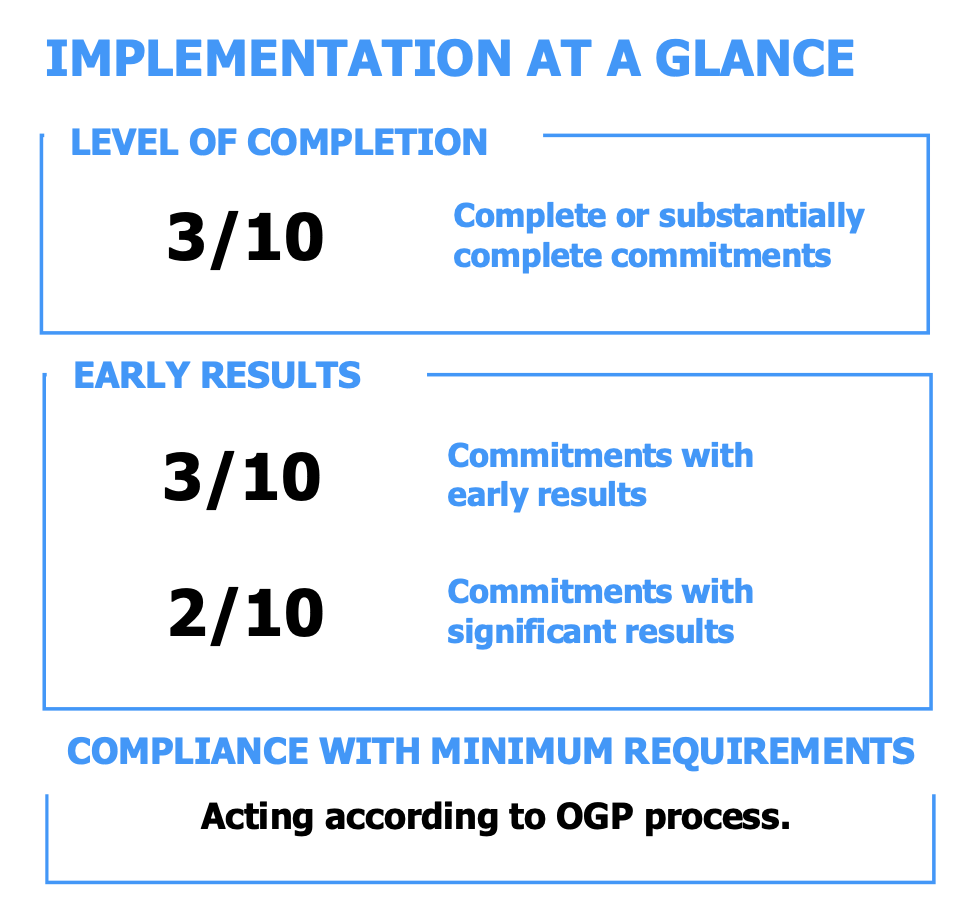Romania Results Report 2022-2024
- Action Plan: Romania Action Plan 2022-2024 (June)
- Dates Under Review: 2022-2024
- Report Publication Year: 2025
Under Romania’s sixth action planAction plans are at the core of a government’s participation in OGP. They are the product of a co-creation process in which government and civil society jointly develop commitments to open governmen..., sustained commitments across action plan cycles and civil society engagement led to notable results in transparencyAccording to OGP’s Articles of Governance, transparency occurs when “government-held information (including on activities and decisions) is open, comprehensive, timely, freely available to the pub... More and open dataBy opening up data and making it sharable and reusable, governments can enable informed debate, better decision making, and the development of innovative new services. Technical specifications: Polici.... For future success, reformers can strengthen government stakeholder buy-in, support for the open government agenda nationwide, and inter-agency coordination.

Early Results
Out of the 10 commitments in this action plan, one achieved moderate and two significant results. Notably, two of the three commitments identified as promising in the Action Plan Review delivered significant early resultsEarly results refer to concrete changes in government practice related to transparency, citizen participation, and/or public accountability as a result of a commitment’s implementation. OGP’s Inde... More. This marks a contrast to the previous cycle, where no commitments achieved significant results.
The two most successful commitments are CommitmentOGP commitments are promises for reform co-created by governments and civil society and submitted as part of an action plan. Commitments typically include a description of the problem, concrete action... 6 under which the government provided data on the allocation of substantial resources for local development plans in Romania. The public has now access to implementation data for two local development programs multiple times per year. Second, the government advanced comprehensive implementation of the 2022 Open Data law (Commitment 7). This led to the publication of 40% more datasets, from 3,200 in July 2022 to 4,679 in September 2024, in the country’s open data portal. Both commitments benefitted from sustained engagement from Romanian civil society, which laid the groundwork across multiple cycles to achieve these outcomes.
Completion
The action plan addresses several key areas that Romania has consistently focused on. This includes local investment fund transparency, open data, and reducing bureaucracy. It also introduces new focus areas, such as participatory budgeting, improving access to justiceAccessible justice systems – both formal and informal – ensure that individuals and communities with legal needs know where to go for help, obtain the help they need, and move through a system tha... More for victims of gender-based violenceReforms that combat gender-based violence are essential for fostering an inclusive society and government that respects human rights and promotes gender equality. Technical specifications: Commitments... More, and enhancing genderOGP participating governments are bringing gender perspectives to popular policy areas, ensuring diversity in participatory processes, and specifically targeting gender gaps in policies to address gov... More equality in decision-making. Despite greater progress compared to previous action plan cycles, this progress was somewhat limited due to a lack of high-level political support (particularly influenced by the country’s election cycle) and coordination issues between state agencies. Three commitments were substantially completed or completed, a decrease compared to the previous action plan.
Commitments that were substantially completed or completed benefitted from sustained engagement from civil society. Civil society seized momentum, such as the repetition of certain topics in the press (commitment 6) to deliver results. Publication of open data for transparency, accountability and social innovation is the policy area that delivered the most notable results. Commitments related to culture and justice (commitments 3 and 4) made limited progress, whereas the commitments related to extractive industries and environmental issues (commitments 5 and 10) were not started. High-level authorities from the respective ministries had little to no engagement in implementation.[1]
Participation and Co-Creation
The Romanian OGP process is overseen by the National Coordination Committee (Comitetul Național de Coordonare, or CNC). It comprises seven representatives from public administration agencies and seven representatives from civil society organizations (CSOs). Civil society played a key role by proposing and amending commitments and by taking part in the CNC. Not all CSO members maintained consistent interest and participation during implementation.[2] Some were unable to allocate sufficient resources to the open government agenda or were preoccupied with the approaching electionsImproving transparency in elections and maintaining the independence of electoral commissions is vital for promoting trust in the electoral system, preventing electoral fraud, and upholding the democr... More. Despite these challenges, civil society, in general, sustained a meaningful level of engagement throughout the cycle. Their feedback was considered in monitoring all the commitments and in implementing some of them, as was the case in previous action plans. Overall, the country acted according to OGP process.
Implementation in Context
The consistent and determined efforts of Romanian civil society, particularly in areas such as transparency and open data, have been instrumental in driving progress. However, in 2024, Romania held and will hold several important elections. Local elections, including mayoral and council seats with the European Parliament elections took place in June. Presidential elections will take place in November, followed by the national parliamentary elections in December. The run up to the election in Romania has temporarily diverted attention from governance reforms, creating obstacles for planned initiatives. Additionally, the lack of sufficient coordination and integration among government agencies has hindered fulfillment of some commitments.
[1] Septimius Pârvu (Good governance and Elections at Expert Forum), interview with IRM researcher, 6 September 2024; Larisa Barac (OGP Point of Contact for Romania), interview with IRM researcher, 29 July 2024.
[2] Pârvu, interview; Barac, interview.

Leave a Reply